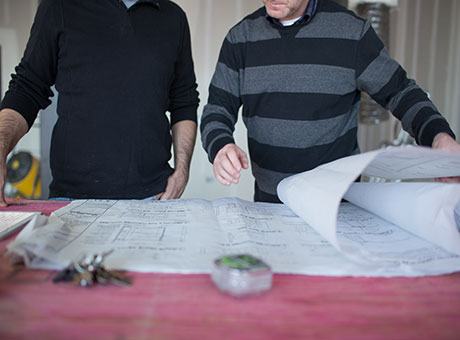From the electricity, running water, and refrigeration in your home to the buildings, bridges, and machinery in your city, most modern conveniences are the work of skilled tradespeople. Trade jobs are among the hardest to fill, despite how much they enrich everyday life. The good news for you is that trade jobs offer high income and relatively low educational costs, making them ideal for kickstarting a successful career without racking up huge debt. If you enjoy hands-on work in diverse environments, here are some of the best trade businesses to start in Canada.

Five Trade Businesses to Start
Masonry
Masons build and repair brickwork and stonework on residential and commercial structures. They use a variety of construction and brick-laying techniques to create beautiful walkways, walls, stairwells, fireplaces, and patios. Picture the decorative brick bridges, towers, wells, foundations, and building facades you see in nearly every town. Masons need to be physically strong to lift heavy materials and meticulous at laying stonework. Classroom training may be necessary in some cases, but most masonry training happens on the job during three to four years of registered apprenticeship. Masonry typically has voluntary certification in Canada, so there are few barriers to employment before you’re ready to start your own business.
Electrician
Electricians are experts at installing and maintaining electrical wire systems. When you think about the thousands of powered homes and buildings in your area, you can understand why demand for electricians is steadily growing. They routinely travel to different sites, work with power tools, and analyze schematics. Electricians can get certified after four to five years of apprenticeship and training. Certification is usually required after apprenticeship to work in domestic or construction environments, but it’s often voluntary for other applications. Consider training in the electrical field if you’re detail-oriented and comfortable with evaluating risks.
Commercial Diving
If you’re a skilled swimmer who’s comfortable staying submerged for long periods, commercial diving is a smart way to combine technical, mechanical, and physical skill sets. Diving contractors travel underwater to perform construction and maintenance tasks on building foundations, vessels, bridges, docks, and other structures. A sense of adventure and calmness under pressure are vital for using industrial equipment, cameras, and sonar devices in aquatic environments. This is especially true if you work in deep-diving jobs that require you to stay underwater for weeks. Divers have to be strong, self-guided workers who can follow safety codes without constant supervision. A diving career opens the door to diverse industries, including construction, inspection, salvage, search and rescue, scientific research, and photography. You can get certificated after a few weeks or months of training at a diving centre, but the type and length of certification depends on your experience and industry.
Plumbing, Pipe-fitting, and Steamfitting
Plumbers, pipe-fitters, and steamfitters create, install, and maintain piping systems for waste disposal or heating and cooling. These skilled tradespeople work with hazardous waste, liquids, gases, steam, and high-pressure systems, so they generally need several years of apprenticeship, vocational training, and certification. Homes, businesses, and industrial environments rely on plumbers, pipe-fitters, and steamfitters to design efficient layouts that safely transport materials to designated locations. People need piping professionals for wide-ranging applications of all sizes, making work readily available for independent contractors and small businesses. Plumbing and related careers are ideal if you enjoy making your own hours, working independently, and solving problems. While plumbers, pipe fitters, and steamfitters often go unnoticed when they work, they are blue-collar heroes who find and fix problems that could otherwise cause waste backups, contamination, or explosions.
Welding
Modern machinery and vehicles can’t exist without talented welders to join, cut, and polish metal pieces. Imagine the smooth seams on cars, sturdy structures of buildings, and impenetrable curves of metal pipes, and you can see how expert welders make the world safer for everyone. Welders work in industries ranging from oil and gas to forestry and metal fabrication, so they frequently learn welding techniques specific to their occupational fields. As a welder, you have to be fearless in the face of intense heat and flying sparks, mindful of safety protocols, and knowledgeable of blueprints and assembly specifications. Welders need certification to wield dangerous heating equipment, such as torches, and manipulate various metals for machines, automobiles, aircraft, ships, and buildings. Be prepared to complete technical training and apprenticeship before getting certified, which is typically based on the metals and welding techniques you master.
Overcoming Stereotypes About Trade Jobs
Shortages in skilled trades are increasingly common as older generations retire from the workforce. An emphasis on college education is a key reason for the decline. In a 2014 survey by the Canadian Apprenticeship Forum, more than 50% of parents said they favour post-secondary education over vocational training, and 25% believe trade jobs are for weaker students. Parents mistakenly view jobs involving physical labour as a sign of lower intelligence, and they miss opportunities to introduce children to rewarding jobs in high-paying industries. In reality, trade jobs are challenging and mentally stimulating, often requiring strong math, science, mechanical, and technical skills. Consider the pride and self-respect you can gain from creating things people use every day. Many of these roles involve self-guided work, turning the most inexperienced workers into confident leaders, independent learners, analytical thinkers, and creative problem solvers. Most aspects of trade jobs can’t be automated or outsourced, so skilled tradespeople always have a place in the Canadian workforce. More importantly, apprentices learn and earn simultaneously while paying a fraction of the cost of traditional post-secondary education. Skilled trades provide a direct path to employment and entrepreneurship a guarantee you rarely get with a college degree.


